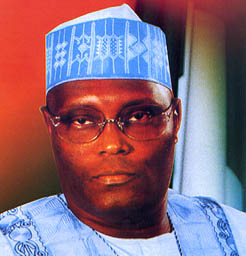Atiku files brief for witness in election petition to give evidence
 |
Atiku |
Former Vice President and Presidential Candidate of the Action Congress (AC) in the April election, Atiku Abubakar yesterday asked the Presidential Electoral Petition Tribunal to allow witnesses subpoenaed by the Tribunal to personally tender documents and give oral evidence.
The Tribunal had on Tuesday asked the AC candidate to put his request in writing .The Tribunal also ordered counsel to Alhaji Umar Yar’Adua and the Independent National Electoral Commission(INEC) to respond to Atiku’s prayers latest by 12 noon today(Thursday).The court is to give its ruling on the matter at 2p.m today.
Atiku had on Tuesday requested the Tribunal to allow witnesses subpoenaed by the Tribunal on his request to present documents in their custody and give oral testimony. The Tribunal objected on the ground that counsel to parties in the case had agreed that oral evidence would not be taken during the trial. Counsel to the PDP AND INEC also argued that the witnesses listed did not have their depositions listed by Atiku.
However, Atiku’s lawyers argued that the witnesses in question were not within the power of the AC Candidate to enable him make them depose their statements on oath. They argued that they were independent witnesses who can only come to court under court order. They explained that this was why they applied to the Tribunal to subpoena them,which the Tribunal granted. “The essence of calling witnesses under subpoena is to compel a competent witness over whom the party calling has no control to attend under judicial command,” they stated in their Motion on Notice.
The subpoenaed witnesses whose appearance are in contention are the Country Representative of the European Union Observation Mission, National Secretary of Justice Development Peace/Caritas Nigeria, National Coordinator of the Transition Monitoring Group, Country Director of the Democratic Institute, Country Representative of the International Republican Institute, the Director General of the Nigerian Television Authority(NTA), and Nigeria Airspace Management Agency(NAMA).The others are the Managing Directors of the Channels and AIT television stations.
In the Motion on Notice filed in the Tribunal yesterday, counsel to Atiku led by Professor Ben Nwabueze, Professor Alfred Kasumu and Professor Itse Sagay, listed nine grounds why theTribunal should grant the application:
· the subpoenaed witnesses are independent and uninterested persons who could not have been deposed on oath and in writing as Petitioners’ witnesses at the time of presentation of the petition.
· Witnesses on subpoena are exempted from the category of witnesses to give written deposition on oath at the time of presentation of petition.
· the subpoenaed witnesses are under obligation to obey the command of the honourable court.
· the documents sought to be tendered through the witnesses were indicated in the petition, the petitioners’ reply, and in the list of petitioners’ documents as procurable only through a subpoena.
· the leave of the honourable court was sought and obtained for the subpoena to be issued and served upon the concerned witnesses.
· the subpoenaed witnesses have come to tender documents and give oral testimony in respect thereof in obedience to the command in the subpoena.
The counsel to Atiku also noted that the Tribunal had on the 25th of September, 2007 indicated that the petitioners are at liberty to adduce additional evidence in reaction to the leave it granted INEC to file additional list of witnesses and witness depositions on oath.
Citing several legal authorities including Supreme Court judgments to support their position, Atiku’s counsel recalled that in the petition over the 2003 presidential election, the Supreme Court had blamed the refusal of the Trial Court to admit the evidence of some witnesses not under the control of the petitioner, Alhaji M.D Yussuf, on the failure of his counsel to get the Election Tribunal to compel the witnesses who disobeyed court subpoena to appear in court and present their documents. The Court ruled that the submission of such documents from the bar could not be a substitute for the witnesses’ own evidence.